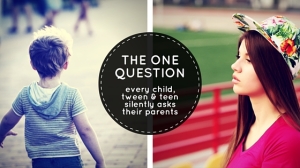The One Question Every Child, Tween & Teen Silently Asks Their Parents
by Westminster
Every single parent I know wants to do a good job raising their kids.
But after that, the unanimity about how to do it usually goes out the window.
 We want them to be successful and well-adjusted. We want them to work hard and be kind. We want them to develop a strong moral compass and make the world a better place.
We want them to be successful and well-adjusted. We want them to work hard and be kind. We want them to develop a strong moral compass and make the world a better place.
(We also want them to finish their dinner, be grateful for what they have, and pick up after themselves!)
But in a new age, some of the wisdom from the past is dissolving (not always a good thing); there is a flood of parenting books and talking heads; parents seem to be awesome at looking down their noses at one another; and now more than ever there is a need for renewed clarity about what is vital.
A few years ago a counselor named Anne Springle was giving a talk to a group of 30-somethings at our church. She was leading a workshop on parenting at different stages.
One of the things she said was that kids of all ages have a question that they silently ask their parents.
It was so powerful that it has stuck with me for several years and has become a kind of invisible coach in my own parenting. Here it is:
Will you show up for my life?
Now hold on a minute. I know what you’re thinking: “Is that it, Matthew? If so, you should have done more homework!”
But there’s more in that question than you think.

“Showing up” doesn’t just mean that you’re physically there. “Showing up” is your deliberate physical, emotional and spiritual engagement in the life of your child, tween or teen.
And it’s more significant than you think.
An infant silently wonders if the primary caregivers in their life will provide them with consistent security and safety.
A toddler silently wonders if the primary caregivers in their life will help them learn and do things on their own.
A child starting and growing in school silently wonders if they have your attention.
A child in grades four, five and six silently wonders about how to make friends.
A tween silently wonders who they are and where they belong.
A teenager silently wonders if the primary caregivers in their life will help them know how to belong, what to believe, and how to make an impact on the world.
- (To read the blog called 5 High-Value Parenting Habits from my Parents’ Generation (That We Can Bring Back) click here)
So what else does “showing up” look like?
It means consistency and fairness.
It means coaching them how to deal with conflict at school.
It means thoughtful discipline so they learn how to speak, share, be a part of a community and family team, and respect authority.
It means working margin and rest into your schedule so that you’re not always zonked at home. (The un-busy moments are usually when the big questions and conversations happen.)
It means being emotionally available as a guide through moral grey zones and awkward body changes.
It means having time when you’re doing “nothing” so that those meaningful moments can emerge, especially for kids over 12 who are dying for people to be authentic and take them seriously.
If you’re married, it means making your relationship a priority so that your emotional address is made of brick and not straw.
It means looking in the mirror and realizing that your kids may not always listen to you, but they will sure copy you.
It means not jumping up to check your phone during dinner as if it were the Queen on the other end. (Writer and Pastor Jud Wilhite says that when he’s with his family and turns off his phone it’s in “relationship mode.”)
When it comes to parenting, “showing up” means being aware. Your child’s real parent is God and you’re on temporary assignment to care for his son or daughter in the path of goodness and holiness.
Unfortunately, I think one of the biggest traumas in parenting today is a kind of presence that is actually absence.
"One of the biggest traumas in #parenting today is a kind of presence that is actually absence" #parentingtweets
— Matthew Ruttan (@MatthewRuttan) May 27, 2016
But that’s not you.
Wouldn’t it be great if we could answer ‘Yes’ to these 2 questions…
- Will you invest in me more than your work, phone, Facebook or favourite channel?
- Since this whole life thing is really confusing and you seem to have lived a bit more of it than me, can you be a guide I can trust?
In their book It’s Just a Phase, So Don’t Miss It, Reggie Joiner and Kristen Ivy say this: “The only way to prove love is to prove it over time, consistently, in spite of what changes.”
I think God wants us to maximize our time doing the big things and minimize our time doing the little things.
"I think God wants us to maximize our time doing the big things and minimize our time doing the little things" @MatthewRuttan
— Matthew Ruttan (@MatthewRuttan) May 27, 2016
And one of the hand-down, clear-cut, call-it-out big things…
is parenting.
Right now your child, tween or teen is silently asking you a question: Will you show up for my life?
How will you live, love and lead the answer?
Recommended Posts

10 Unpopular things Jesus said
July 23, 2024

The Intel Report No.2 – Demons, Possession & Exorcism
July 17, 2024
